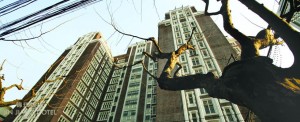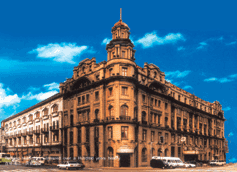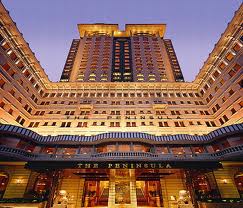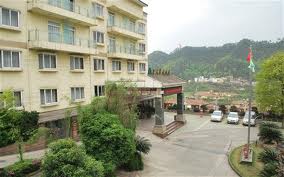Historic Hotels in China
Posted: June 15th, 2012 | No Comments »Talking of hotel luggage labels yesterday, I recently got asked by a media organisation to come up with some historic hotels in China…but then they didn’t use it, so you lot get it…and a more deserving group you are too…
1) The Jinjiang Hotel – Shanghai
The Jinjiang Hotel, once the gorgeous Cathay Apartments in the old French Concession. Most famously though where President Nixon and his team stayed in 1972 when they arrived to break the Cold War ice and sign the “Shanghai Communiquéâ€. The Chinese even built a special hall for the signing next door to the hotel. The Jinjiang’s management claim Nixon said the hotel was the best he ever stayed in…but then we know Tricky Dicky had a flexible relationship with the truth!
2) The Pujiang Hotel – Shanghai
The former Astor House Hotel had a lot of famous guests over the decades and now likes to claim Zhou En-lai, Mao’s right-hand-man and the Premier of the PRC, as a long stay guest. Though it’s contentious, as Zhou was not a normal guest seeing the sites but rather hiding out in the Astor in 1927 as outside he was being hunted down as a Communist agitator. The urbane Zhou and his wife posed as tourists, dressed in western clothes and conversed only in English or French so that nobody would realise he was, at the time, the most wanted man in Shanghai with a price on his head.
3) The Peking Hotel – Beijing
It’s hard to believe but before June 1989 CNN was little known outside the USA. Then the tanks rolled into Tiananmen Square to crush the student protestors and CNN was right there with cameras rolling. Veteran journalists John Holliman and Bernard Shaw were in the thick of it. CNN’s Beijing correspondent at the time Mike Chinoy maintains that CNN’s coverage of the massacre, while the tram were based in the Peking Hotel, ” put CNN on the map”. The balconies of the Beijing Hotel were where most of the footage of the Square was shot from including AP’s Jeff Widener and his iconic picture of a lone man with two shopping bags who stopped a tank. Tiananmen was just the latest event witnessed by guests at the former Grand Hôtel de Pékin built as the capital’s grandest lodging house in 1917.
4) The Astor House Hotel – Tianjin
Not many know that the regal Astor on the banks of the Hai River in the heart of the former British Concession of Tientsin was the favourite hotel of a young American mining engineer by the name of Herbert Hoover who later became the 31st President of the United States. In reality the Hoover’s only stayed in the Astor for a few weeks in 1899 but that hasn’t stopped the hotel opening a “Hoover Suite†and intimating he was President when he stayed there – not quite, Hoover wouldn’t be the Commander-in-Chief for another 30 years. Still, he did pick up a little Chinese and reportedly used it in the White House when he wanted a private conversation with his wife.
5) The Cathay Hotel – Shanghai
Sir Victor Sassoon’s impressive Bund-side hotel was home to many famous visitors. But here’s an unlikely pairing to demonstrate the hotel’s range! Just a year after the hotel opened in 1930 Noel Coward arrived from Singapore with a terrible bout of the flu. Confined to bed, Coward busied himself writing what would become his most famous play, Private Lives. By way of contrast, during the Cultural Revolution, or as it’s now officially known “the ten years of madnessâ€, the Cathay became the base for Madame Mao and the notorious Gang of Four. Proletarian revolutionaries they may have been but they knew a stylish hotel when they saw one!
6) The White Swan Hotel – Guangzhou
The White Swan stands majestically upon Shamian Island, the spit of land where foreigners were first allowed to settle and trade in Canton, now Guangzhou. It was one of China’s first five star hotels and is also home to one of the greatest urban legends of modern China – the Queen’s mobile throne! When Queen Elizabeth II visited in 1986 she was the first British monarch to set foot on Chinese soil and she stayed at the White Swan. However, a legend was born that every Chinese person believed at the time – the tale that the Queen brought her own toilet to China and that it accompanied her everywhere to allow her to avoid using a Chinese loo. True or false? Buckingham Palace will not confirm or deny, but it doesn’t matter as everyone believes in the legend of the Queen’s mobile throne.
7) The Yamato Hotel Mukden – Shenyang
Yamato were a Japanese-built hotel chain in northern China known for their modernist architecture and sumptuousness. No wonder then that the Yamato Mukden, now the Liaoning Hotel Shenyang, was a favourite of Mao Tse-Tung and Den Xiaoping when on business up north. It’s a palace of a hotel so perhaps fit for supreme leaders enjoying the Mandate of Heaven…and close to the railway station where Mao’s personal and private train carriage could wait for him. Incidentally, the Yamato Hotel in Dalian (now the Dalian Hotel) was the favourite out-of-office meeting place for the former mayor, the now slightly more well-known Bo Xilai!!
8) The Peninsula – Hong Kong
The grand old lady of Kowloon, overlooking the harbour and facing The Peak opposite and, once, right next to the railway station where the trains arrived from Canton (in case you’re wondering why Hong Kong’s grandest hotel is Kowloon-side). Depending on your style choose your Peninsula hero – W. Somerset Maugham staying here in the “finest hotel east of Suez†drinking gin Martinis; James Bond in The Man With the Golden Gun using the hotel’s fleet of Rolls Royce’s or; Bruce Wayne (aka Batman) arriving on the hotel’s rooftop helipad in The Dark Knight.
9) The Lucky Holiday Hotel – Chongqing
Technically called the Nanshan Lijing Guest House, but better known as the Lucky Holiday Hotel. Secluded villas with views of the sprawling metropolis of Chongqing below. Scenic for sure…but lucky? Perhaps not, as this previously rather obscure hotel was where British businessman Neil Heywood died, allegedly murdered, in November 2011 kicking off China’s most notorious and mysterious political scandal for decades. Don’t expect any plaques or a confessional tell-tale sessions from the management – they’re denying everything and anything!









Leave a Reply